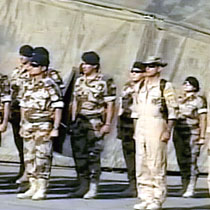-
(单词翻译:双击或拖选)
By Bill Rodgers
Washington
28 June 2007
NATO's role has changed dramatically since the end of the Cold War and some say the 26-member grouping should eventually evolve into a global security alliance. For now, however, NATO's main challenge in maintaining its cohesion1 and effectiveness lies in Afghanistan. VOA's Bill Rodgers reports on the discussion over NATO's future.
 |
| NATO Forces |
Now, some are calling for NATO to evolve into a global security alliance by allowing Australia, Japan, and other countries to become members and contribute forces.
Democratic Congressman3 Tom Lantos, chairman of the House Foreign Affairs Committee, made the suggestion at a recent hearing. "What, except the word Atlantic, prevents Australia, with flexibility4 on the part of NATO, to become a member of a renamed North Atlantic Treaty Organization? Would it not make the supreme5 allied6 commander feel more comfortable about upcoming global crises if he would have a NATO of a global reach?"
NATO's Supreme Allied Commander, General Bantz Craddock, testified at the committee hearing. He agreed on the benefits of expansion, but also warned of obstacles. "From a perspective of planning and preparing at my headquarters we are looking at the ability to expand. Is that a first step to a global enlargement? I don't know. That will, obviously, be a political decision. But I think it is indeed a recognition that the level of ambition is significant and, quite frankly7, it is not matched by the political will of the nations to meet that level of ambition and we must continue to push on our member nations to provide that capability8."
And it is in Afghanistan that the issue of NATO member capability is paramount9. An international force of some 40,000 soldiers is in Afghanistan, with most of the troops coming from NATO's 26 members. But some member nations -- such as Germany and Spain -- have restrictions10, known as caveats11, on how their forces are used.
NATO expert Stephen Larrabee, Rand Corporation, says, "It is a challenge and a threat to cohesion. That is why it is essential, in my view, over the long-term that these caveats are reduced and eliminated if possible, otherwise the cohesion of the alliance will definitely be affected12 and so will its effectiveness."
Discussions have taken place over the caveats and some progress has been made. But as suicide bombings and other attacks continue, some member nations are questioning their future participation13 in the Afghanistan mission.
Analyst14 Larrabee believes NATO's future is at stake in Afghanistan. "We seem to be in a stalemate and a stalemate is not good enough. We will have to be able to show, if NATO has a real future, that it is able to, in fact, meet these challenges not just be engaged in a stalemate."
Canadian Prime Minister Stephen Harper has said the mission in Afghanistan will not be extended beyond 2009 without a consensus15 in his country and parliament. The comment reflects the difficulties NATO faces in maintaining cohesion as its role evolves in meeting 21st century challenges.
 收听单词发音
收听单词发音
1
cohesion

|
|
| n.团结,凝结力 | |
参考例句: |
|
|
|
2
Soviet

|
|
| adj.苏联的,苏维埃的;n.苏维埃 | |
参考例句: |
|
|
|
3
Congressman

|
|
| n.(美)国会议员 | |
参考例句: |
|
|
|
4
flexibility

|
|
| n.柔韧性,弹性,(光的)折射性,灵活性 | |
参考例句: |
|
|
|
5
supreme

|
|
| adj.极度的,最重要的;至高的,最高的 | |
参考例句: |
|
|
|
6
allied

|
|
| adj.协约国的;同盟国的 | |
参考例句: |
|
|
|
7
frankly

|
|
| adv.坦白地,直率地;坦率地说 | |
参考例句: |
|
|
|
8
capability

|
|
| n.能力;才能;(pl)可发展的能力或特性等 | |
参考例句: |
|
|
|
9
paramount

|
|
| a.最重要的,最高权力的 | |
参考例句: |
|
|
|
10
restrictions

|
|
| 约束( restriction的名词复数 ); 管制; 制约因素; 带限制性的条件(或规则) | |
参考例句: |
|
|
|
11
caveats

|
|
| 警告 | |
参考例句: |
|
|
|
12
affected

|
|
| adj.不自然的,假装的 | |
参考例句: |
|
|
|
13
participation

|
|
| n.参与,参加,分享 | |
参考例句: |
|
|
|
14
analyst

|
|
| n.分析家,化验员;心理分析学家 | |
参考例句: |
|
|
|
15
consensus

|
|
| n.(意见等的)一致,一致同意,共识 | |
参考例句: |
|
|
|















